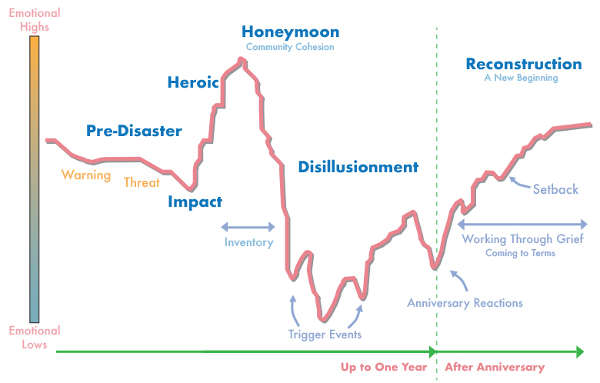
KELSEYVILLE, Calif. – Lake County has experienced large scale fires for the past four years with the most recent, the Mendocino Complex fire of 2019, becoming California's largest in recorded history.
The Lake Family Resource Center's California HOPE team recognizes that as we come closer to the anniversaries of these catastrophic events, community members may experience a range of reactions and they want to offer support and tips for resilience.
"Whether it's a triggering of past emotional responses or never-before experienced reactions," noted Lake FRC Executive Director and Cal HOPE Program Manager, Lisa Morrow, "It's important to understand that these reactions are normal, given our community's experience with large scale disasters in recent years."
Besides learning the cause of the event, the season, weather and anniversary period can help trigger community members to feel a renewed sense of grief, sadness, fear, anxiety, depression, frustration, anger and guilt. Sometimes, these reactions arise for the first time around the anniversary period, other times, they can be renewed or intensified.
The anniversary can also be an important time of meaningful remembrance and reflection. It often becomes a turning point in the recovery process, according to team lead, JoAnn Saccato. "This can be an opportunity for great healing. Looking back over our own progress, making note of the problem-solving we've done, and making connections in community all point to our recovery and growing resilience."
Some key things we can do as adults include:
– Be willing to address unresolved issues and feelings. Reaching out for support during times of need is a sign of resilience. California HOPE team members are available to meet with individuals and families. Call 707-349-5203. After hours support is available 24 hours a day at 800-900-2075.
– Help plan or participate in meaningful community events and rituals. Acknowledging our losses with a kind attention can be a healing salve.
– Limit exposure to traumatic images in the media. Monitor social media viewing and any non-essential exposure to event information and imagery.
– Temporarily up your self care routine. Reach to supports that have worked in the past during stressful times. Add an extra exercise session to your week or try a new exercise, such as yoga, Pilates, or swimming. Make a date with a trusted friend and spend time talking about what you've accomplished over the past year. Try something new – walk or bicycle a new path, learn meditation, visit a new synagogue, temple or other spiritually nourishing site. Sit outside and listen to and watch nature. Take a nap. Listen to your favorite music.
– Talk with a Cal HOPE outreach worker. Teams are regularly in community three days a week all around the county with their Cup of HOPE events or can be met with privately by appointment in a mutually convenient place. Visit www.lakefrc.org/calhope for the Cal HOPE team weekly schedule or call 707-349-5203 to set an appointment.
– Spend time preparing for emergencies: Taking action to feel prepared can help us feel more secure and ready for the unexpected. Include the whole family and consider those with limited capacity to act, such as children and elderly.
Tips for parents and children:
– Parents can model calm behaviors for children: Children learn more by what they see than what they hear.
– Allow children to experience the anniversary in their own way: Help them recognize and cope with reminders. Be honest about their own and adult reactions and concerns in ways that they can understand.
– Maintain routines: Children and adults can feel safer and more secure with structure and routine.
– Repeat instructions often: Be patient. We all may need reminders or extra help when we're distracted or triggered.
– Provide extra support for children at bedtime: Children may become anxious when they separate from parents, particularly at bedtime. Try to spend more time during this time by doing something meaningful, like reading a story together.
It is OK to make temporary arrangements for young children to sleep in bed with their parents with the understanding they'll go back to normal sleeping arrangements at a date set in the future.
Helping children feel prepared for a future unexpected event can bring a sense of safety and security. Creating a treasure box that's ready to go in a moment's notice with special items can bring peace of mind.
If reactions are concerning or last longer than feels healthy, the National Disaster Distress Helpline at 800-985-5990 (or text TalkWithUS at 66746) and the Crisis Intervention Hotline at 800-900-2075 are available 24-hours a day for those needing immediate emotional support.
"There is hope for recovery in a community that supports each other," concluded Morrow. "And the Lake FRC Cal HOPE project is here for a little longer to provide some of that support."
Lake Family Resource Center's California HOPE is a short-term community based project ending in August of 2019. Its mission is to help Lake County residents recover from recent wildfires.
Outreach workers provide free and confidential services to individuals, families, groups and organizations impacted by recent fires, including information and linkage to resources, emotional support, education, and community networking opportunities.
Additionally, free workshops and educational presentations exploring the phases and reactions to disasters are available to groups, schools, businesses and organizations.
For more information on Lake Family Resource Center's California HOPE and upcoming activities and events, visit its Web site or Facebook page, or call 707-349-5203.
Services are provided by Lake Family Resource Center through a grant from Lake County Behavioral Health Services.

 How to resolve AdBlock issue?
How to resolve AdBlock issue? 



